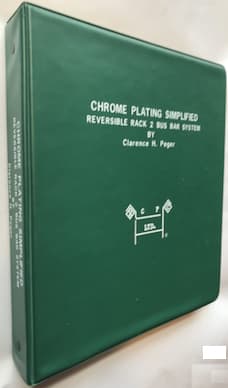
-----
Replacing Polypropylene tanks with Fibre Glass tanks for chromic acid and nitric acid
Q. We have a problem I am encountering in the Powder Coating Plant. The pretreatment process consists of i) Degreasing Tank ii) Etch Tank iii) Double Rinse Tanks iv) Desmut Tank v) Desmut Rinse Tank vi) Chromate Conversion Tank vii) Chromate Rinse Tank viii) De-ionizing Water Tank ix)Drying Tank
Question 1)The problem we are encountering is that the Chromic Acid and Chromic Rinse Tanks are leaking at the bottom and we failed to mend/repair them. These tanks are made of propylene or poly plastic material how can we mend/repair them?
Question 2)Can we use fibre glass coated tanks for chromic acid and nitric acid?
Quality Assurance Officer - Harare, Zimbabwe
2007
A. Hi Mobius,
Re your PP tankage for chrome & nitric.
Firstly, PP sure isn't recommended for any, one assumes, welded tanks for nitric. You'll get stress cracking at the welds. Who suggested using PP ?
For chrome? I (being ignorant) would never have recommended PP for chrome unless it was a l00% moulded tank. Everyone seems to think that a mild steel tank lined with a h.d. PVC liner is the key .... and eventually, after quite a few years, said liner would need replacing.
Then there's the air/liquid interface where normally it is recommended that an additional layer is installed.
Fibreglass. Ah, it sounds beautiful but that material is , unlike PP, Pe, PVC & all thermoplastics, not homogeneous.
If it's well made, If the right resin (Polyester or Vinyl ester is used), then LOOK OUT if the outer corrosion barrier gets scratched and that will lead to failure.
Why can't you use stainless for the nitric tank?
I'm a fervent believer in dual laminates where the weaker thermoplastic material is externally reinforced with FRP/
Go and have a look-see at the archives and hit #8169 and #7132 + #9872 and perhaps #19200..

Freeman Newton [deceased]
(It is our sad duty to advise that Freeman passed away
April 21, 2012. R.I.P. old friend).
A. Q1: Drop in a molded (no-weld) sleeve or "jacket" inside the defective tank. They are custom made to your needs.
Q2: No.
Monterrey, NL, Mexico
2007
A. Fibreglass lined tanks can be used to contain both chromic acid and nitric acid as long as the correct resin is used and dependent on what concentration and temperature the acids are used at. I know of a couple of installations where plating passivate and nitric pre dip tanks have been repaired in this way. As long as the linings are inspected for physical damage when empty (which should happen no matter the lining) it's a perfectly safe method of repair.
John Martin- Wales
2007
by Clarence H. Peger

(copies are avail. in select libraries)
Very rarely available from
eBay or Amazon
or AbeBooks
(affil link)
A. A number of years ago I attended one of Clarence Peger's classes on chrome plating. He was using a fiberglassed wood tank with a resin that was not the optimum for chrome because the best resin for chrome could not take the thermal cycling and would crack. The resin that he used was expected to last about 5 years.
My personal belief is the longevity of any fiberglass tank is going to depend on the design and the capabilities of the person that does it. I would chose the Mfgr. with great caution.
- Navarre, Florida
2007
Q, A, or Comment on THIS thread -or- Start a NEW Thread